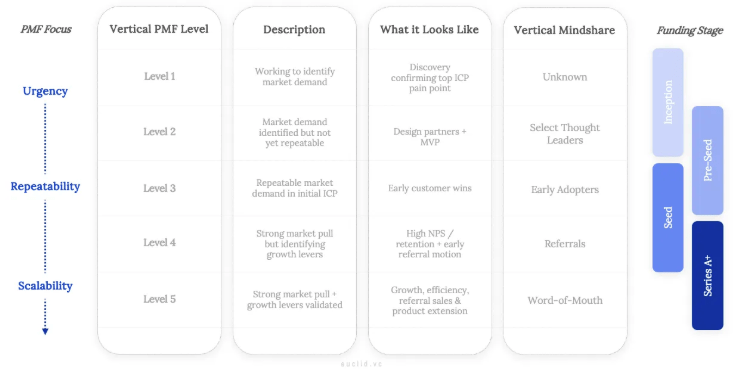Hey y’all — here’s today at a glance:
Opportunity → Second Opinion As A Service
Framework → Healthy PMF By Stage
Tool → Metricool
Trend → Learning To Code’s Value
Quote → What’s The Minimum
PS — Become a member to get access to my founder membership including an engaged community, fundraising support, fireside chats and more.

65% of new hires have no clear points of contact for questions.
Get the guide to avoid other onboarding sins.
Get the free Definitive Guide to Onboarding for 2024 and boost retention, engagement, and the ROI of your hiring efforts.
Want to stop seeing ads? Upgrade now. Want to get in front of 75,000+ founders? Go here.

🔗 Houck’s Picks
My favorite finds of the week.
Fundraising
Growth
ICYMI

💡 Opportunity: Second Opinion As A Service
Here’s an idea that sells to wealthy people and well-funded businesses (aka the best customers):

So what does “second opinion as a service” actually look like? How does it make money?
Simplest way is probably:
Start on one specific niche (i.e. taxes, probably even more niched down)
Source and vet various firms that offer referral fees. Tell them you’ll drive them incremental business
Pitch the service to HNWI and companies. Start by offering it for free to them. It’s too good to turn down at that point, since you’re pitching net savings
Over time, consider charging a commission (percentage of the amount they save) so you get to earn revenue from both sides
🧠 Framework: Healthy Vertical SaaS PMF By Stage
Another day, another PMF framework.
That’s what they say, right?
Personally, I still like Marc Andreessen’s definition the best.
But this one I found this week isn’t too shabby either:

It’s specifically targeted at vertical SaaS businesses, though a lot of it can be applied more broadly.
It does a good job of capturing the “non-exactness” of your search through the idea maze. For example, you can see on the right how the various funding stages have lots of overlap across the various “levels” and what you should be focused on as a founder.
IMO this reflects how searching for PMF is typically non-linear.
They also stress, much like Jen Abel did when we chatted last year, the importance of founder-led sales while you’re still hunting for PMF.
🛠 Tool: Metricool
Social media doesn't have to take over your life.
With Metricool, plan ahead, schedule posts and keep track of your results without the daily scramble. It will actually save you time.
It’s your social media go-to workspace, whether you're flying solo or as part of a team. Simple, powerful and built for agencies, creators, and marketers who want to work smarter not harder.*
📈 Trend: Learning To Code’s Value
Should you learn to code?
For a long time, the answer to that question has been yes if you want to build software (even if you’re not going to be the CTO yourself).
I haven’t been an engineer for ~9 years, but I still use my knowledge of how to be an engineer almost every day when I’m in the details with my team.
But AI may be changing that.
The context here is important — Amjad runs Replit, a platform literally built to help people code and build things, and he's one of the most publicly visible YC founders on X.
You might’ve seen this chart which shows the dramatic decline in job postings for software development in the US:

Part of the decline was expected after a rapid rise immediately following COVID when companies did layoffs and then started hiring for new roles, but surely few people expected it to be this steep or sustained.
A lot of that likely has to do with ChatGPT launching during that downward slide.
If there are fewer software engineering jobs because more code can be written by fewer people due to AI, it’s a valid question.
From a theoretical angle, I’d say absolutely yes — even if AI is helping you code (or doing it for you), you’ll still design a better system and be able to know how to fix it if you understand the fundamentals of programming and system design.
Otherwise you’ll be at the mercy of hallucinations.
💬 Quote: What’s The Minimum?
It’s increasingly easy to get a quick MVP version of your product out there for people to test, especially in software.
But in order for your MVP to collect useful, valid information from users it still needs to, you know, be worth paying for.
Why? Because then the people you’re collecting that useful, valid information from will be the ones who are actually willing to use it — your real users.
Basically, have a high bar for what “minimum” means to you.

How We Can Help
Become a member to get full access to our case study library, private founder community, and more.
We can also help your startup in a few other ways:
Content Creation
Let my team and I ghostwrite for your newsletter, X, or LinkedIn.
Audience Building
Grow your audience + generate leads with my growth service.
Fundraising
Share your round with hundreds of investors in my personal network.
Advising
I’ll help solve a specific challenge you’re facing with your startup.
Advertise in this newsletter to get in front of 75,000+ founders.

“*” indicates sponsored content.

